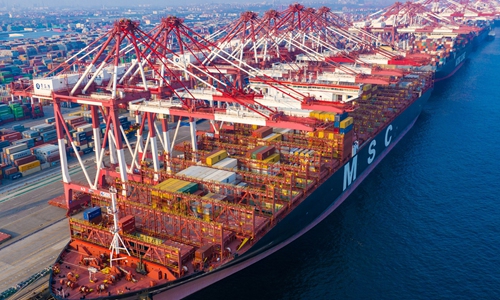HOME >> BUSINESS
Big gaps remain in China-US trade talks
By Wang Cong Source:Global Times Published: 2019/11/19 21:13:41 Last Updated: 2019/11/20 20:16:24
Top govt experts urge strategic patience with US

Containers to be loaded on vessels for export at Qingdao Port in East China's Shandong Province on November 5 Photo: IC
China and the US may still have a long way to go to end the trade war, with major differences remaining over the nature of the bilateral relationship, despite ongoing talks on a possible phase-one deal to defuse tensions, officials, business leaders and top experts said on Tuesday.
The differences were palpable on Tuesday at a business roundtable in Beijing, where current and former officials, business leaders and top experts from both sides exchanged candid views on the trade relationship and how to move forward.
One of the biggest issues is that US officials and business leaders feel that they have not gained as much from China's accession to the WTO as expected, while the Chinese side is trying to make the case that all parties - China, the US and the entire world - have benefited, Zhang Yansheng, principal researcher of the China Center for International Economic Exchanges, told reporters after attending the US-China Entrepreneurs Roundtable.
This fundamental difference is at the heart of the nearly 18-month trade war between the world's two biggest economies. If the business roundtable was any indication, the trade negotiations still face major obstacles to reach any fair and reasonable deal.
Trade negotiators from both countries are trying to achieve a phase one agreement, but uncertainty remains as to when, or even if, they can do so. The two sides held "constructive" discussions over the phone on Sunday over each other's core concerns in the phase one deal and agreed to maintain close contact.
Timothy Stratford, chairman of the American Chamber of Commerce in China, who also attended the business roundtable on Tuesday, said that while businesses are encouraged by the continuing efforts, there are "serious issues" that need to be addressed.
"We think still there are very big differences of opinion in the two governments, so we hope that both sides can find some understanding as soon as possible," Stratford told reporters after the closed-door meeting, part of a China-US political party leaders' dialogue hosted by the International Department of the Central Committee of the Communist Party of China (IDCPC).
Chinese officials have said that as a precondition for any trade deal, both countries must simultaneously and proportionally roll back tariffs, but US officials have not shown any positive response. Instead, US President Donald Trump has even threatened to impose more tariffs on Chinese goods, if a deal was not reached soon.
There are two critical factors in the timing for Trump to reach a deal. First, the US will soon have to decide whether or not to go ahead with previous tariff hikes scheduled for mid-December - a move that will likely change the direction of the talks for better or worse. Second, Trump is facing an impeachment inquiry and an upcoming election season, when his increasingly unpopular trade war could provide ammunition for opponents.
Strategic patience
However, for China, strategic patience and resolve are necessary in dealing with the trade conflict, which could last for years, while continuing to pursue high-quality growth and constructive engagement with the rest of the world, Zhang, who is also an advisor for various Chinese government departments, said.
"Only when both sides cannot fight anymore will there be cooperation. If you want to speed up the transition from unreasonable conflict to cooperation, you have to take good care of your own affairs," he said.
"The Americans have very little historical patience. They are in a rush. China has a lot of historical patience."
Zhang said that for China and the US to move from "unreasonable conflict" to cooperation, there will be a period of confrontation that could last longer than the 15 years it took China to join the WTO - a major milestone for the Chinese economy.
Seemingly applying this long-term theory, Chinese officials are working to build political trust between the two countries by highlighting mutual benefits and common ground, using old and new forms of exchanges.
"We used to focus on facts and reasoning to convince the Americans, but in reality, neither side can convince the other. Now we're adopting the approach of telling more stories about the Chinese people and the Communist Party of China," Zhou Rongguo, deputy director general of the Bureau of North American, Oceanian and Nordic Affairs at the IDCPC, told the Global Times on Tuesday. "This can be more convincing for the other side."
Apart from sharing stories behind China's policies, the IDCPC also invited US political leaders to play ping-pong in between meetings - an activity reminiscent of how the two countries worked to establish formal ties in the 1970s.
Newspaper headline: Big gaps remain in trade talks
Posted in: ECONOMY